Strong Jobs Nebraska: The 2017 Occupational Licensing Review
In this policy brief, Platte Institute Policy Director Sarah Curry reviews the progress and barriers to creating more and better jobs in Nebraska through occupational licensing reforms.
Download an abridged version of this report in PDF format, or click on a link in the table of contents below to be advanced to a particular section, or the appendix.
Table of Contents
Why Is Occupational Licensing an Issue?
Legislation That Failed and Why
Appendix
Exhibit 1: Nebraska Occupational Licensing Legislation in the 2017 Session
Exhibit 2: Federal Trade Commission Letter to Nebraska State Senators
Exhibit 3: Select Occupations Discussed in the 2017 Session
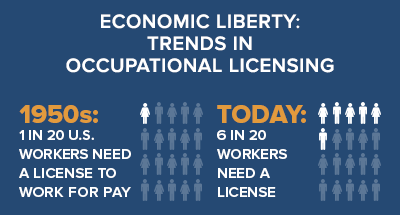 Introduction
Introduction
America is known as the land of opportunity and the land of the free. Likewise, Nebraska is known for offering everyone opportunities to live the Good Life. For many, these freedoms mean having the ability to pursue the vocation of their choice. We frequently ask young children, “What do you want to be when you grow up?” A child’s dreams may lead them to learn a skill or receive education in a particular field, and then find employment, or open their own business. Unfortunately, occupational licensing laws stand in the way of many people trying to follow their dreams and career aspirations.
In the 1950s, less than five percent of the workforce required a license. Today, almost 30 percent of jobs require a license nationally, and in Nebraska nearly 200 different jobs require a government license. There are 1,100 occupations that require a license in at least one state, but only 60 occupations are regulated in all 50 states. For example, while physicians are licensed nationwide, Louisiana is the only state that requires a government license for florists.
Why Is Occupational Licensing an Issue?
Many of Nebraska’s licensing requirements are more burdensome than its neighboring states and the rest of the country, making it harder to create many higher-wage jobs in Nebraska. Nearly 25 percent of the jobs in Nebraska require a government license. Even if a particular worker does not need government permission to do their job, many of the services they depend on in their daily life may be more expensive or less accessible because of Nebraska’s unnecessary barriers for workers and entrepreneurs.
While some regulation will always be needed, Nebraska’s regulatory policies are unnecessarily limiting entry into occupations or industries in a manner that lessens competition. As a result, fewer new jobs and new businesses are being created in Nebraska than in the states which gain the most population and income from relocating Nebraskans. Imposing job licensing requirements not found in other states reduces the upward mobility of Nebraska’s workers and entrepreneurs. This ultimately affects Nebraska’s economy because occupational licensing is costly, both to the worker and the consumer.
The Research
Dr. Morris Kleiner from the University of Minnesota is considered an expert in the field and has conducted research on occupational licensing and its impact on society. His findings on one study claimed, “Licenses are required for more and more professions, and that has two major impacts: consumers are overpaying for services, and workers are being pushed out of professions. There are tremendous societal costs with little improvement to service, quality, health, and safety.”[i]
Dr. Kleiner and fellow economist, Dr. Evgeny Vorotnkiov, published a paper in 2016 that analyzed occupational licensing among the states, finding that occupational licensing increases income inequality. Those that hold a license will see a small increase in their earnings, yet the income benefit of holding a particular license is not enjoyed equally across the income spectrum of employees. Their research finds,
“…individuals in the lowest part of the income distribution— manicurists, for example—are associated with a gain only 3.6 to 5.6 percent due to licensing, but those in the middle of the income distribution gain 7 to 8 percent. Further, those individuals in the top 30 percent of the income distribution gain 11 to 23 percent. … The results suggest that licensing exacerbates relative income inequality, since higher wage occupations tend to gain more from the regulation relative to lower wage ones. These results underline the importance of examining the licensing effect throughout the earnings distribution.”[ii]
A wide variety of research organizations and industry groups have reached the conclusion that while in some cases licenses may needed to protect the public, in many instances occupational licensing is a burden to both the licensee and the consumer. This includes the Institute for Justice, the Professional Beauty Association, the Brookings Institution, Pew Charitable Trusts, ACLU, the Mercatus Center at George Mason University, and the Cato Institute to name a few.
By determining who can enter a profession, trade, or business, these regulations benefit current license holders, limiting competition and driving prices up for consumers. Even the Obama Administration decided to look at the research surrounding occupational licensing, publishing a paper by the Department of the Treasury Office of Economic Policy, the Council of Economic Advisers, and the Department of Labor finding that licensing laws are costing millions of jobs and artificially raising prices for Americans by over $100 billion annually.[iii]
Nebraska Research
There are nearly 200 occupational licenses in Nebraska, which means about 1 out of every 4 workers in Nebraska must have a license to work. According to the 50-State Small Business Regulation Index, Nebraska is ranked 44th, or among the ten worst in the country, regarding occupational licensing rules.[iv] These burdensome regulations come at a cost. One cost is compliance. License holders must pay in time and money to obtain and retain the license. The other cost is the supply of professionals. Occupational licensing represents a barrier that prevents some people from entering a field. The lower supply, in turn, drives up the price of providing these services to consumers and businesses.
A study by the Beacon Hill Institute at Suffolk University attempted to quantify the direct compliance cost of occupational licensing on Nebraska’s economy. They found that,
“The agencies with the highest total fees tend to be those that issue the most occupational licenses, such as the Department of Health and Human Services ($62.1 million), which issues licenses or registrations for over 51 different occupations. Some of these licenses are for occupations that would not require advanced training, such as a purveyor of body art, a swimming pool operator or a paid dining assistant at a skilled nursing facility and cosmetologist. The Department of Labor licenses 15 different types of construction contractors, yet the fees are relatively modest at $2.1 million. The Departments of Motor Vehicles, Banking, Insurance and the Game and Parks Commission also generate higher revenues from fees, permits and licenses at $21.5 million, $29.8 million $17.6 and $28.2 million respectfully.”[v]
While not all the fees collected by these agencies are associated with occupational licensure, it shows that the state collects a substantial amount from individuals and businesses when it comes to fees and licensure. The authors note that one important factor they could not accurately calculate is the impact these occupational licensing regulations have on the private economy. When businesses are forced to spend money on government regulation, this creates an opportunity cost in the form of fewer savings or purchases of new products or items to expand their business.
Also, the cost of the resources used to obtain and maintain the license takes away from the productivity of workers, causing businesses to produce less than they have the capacity to produce. While the study was unable to quantify that amount, it is evident that overburdensome occupational licensure and the associated fees represent significant opportunity costs for Nebraskans.
The 2017 Legislature
Leading up to the 2017 session, the Platte Institute set the stage in Nebraska for removing barriers and cutting harmful red tape, especially in the area of occupational licensing. At the Platte Institute’s 2016 Legislative Summit, Gallup CEO Jim Clifton, the author of The Coming Jobs War, spoke about how he considers the nation’s birth/death rate of businesses to be a national economic crisis that threatens our ability to create more middle-class jobs. This crisis applies to Nebraska as well. Regulatory reform is first on Clifton’s list for freeing entrepreneurs to create new startup businesses. Clifton writes on Gallup.com, “If they want to help, national, state and local governments should stop overwhelming small businesses with new rules and regulations.”
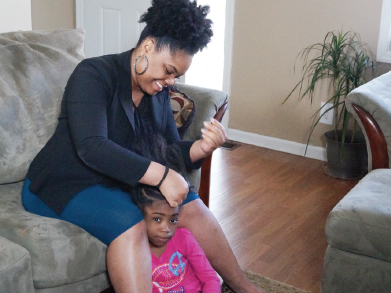 At the same event, the Platte Institute honored Brandy McMorris, an Omaha small businesswoman. McMorris, a natural hair braider, successfully advocated for the passage of Legislative Bill 898 in the 2016 legislative session. The new state law makes it possible for Nebraskans to start a job or business offering natural hair braiding services without acquiring a costly state cosmetology license. At the time, Nebraska state law considered braiding hair for pay without a cosmetology license to be a felony. Acquiring the license takes over a year of training unrelated to hair braiding, and can cost up to $20,000. While the passage of LB898 means hair braiders can now practice their profession freely as in over a dozen other states, these larger requirements for cosmetology are still on the books, leaving Nebraska as one of the hardest states in the country in which to receive a cosmetology license.
At the same event, the Platte Institute honored Brandy McMorris, an Omaha small businesswoman. McMorris, a natural hair braider, successfully advocated for the passage of Legislative Bill 898 in the 2016 legislative session. The new state law makes it possible for Nebraskans to start a job or business offering natural hair braiding services without acquiring a costly state cosmetology license. At the time, Nebraska state law considered braiding hair for pay without a cosmetology license to be a felony. Acquiring the license takes over a year of training unrelated to hair braiding, and can cost up to $20,000. While the passage of LB898 means hair braiders can now practice their profession freely as in over a dozen other states, these larger requirements for cosmetology are still on the books, leaving Nebraska as one of the hardest states in the country in which to receive a cosmetology license.
Optimism
The convening of the 105th Nebraska Legislature began with a continuation of the momentum that started in 2016 with the exemption of hair braiding from the state’s cosmetology license. Senators from all political parties sponsored bills to address issues with occupational licensing in the state. Some called for outright repeal of certain licenses, while others introduced legislation to amend licensure hours, scope of practice, or other specific requirements of licensing for workers.
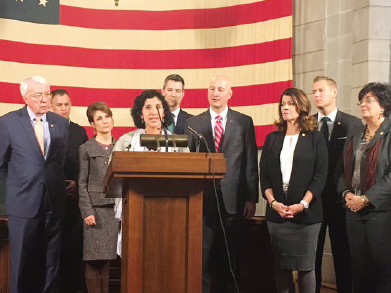
In addition to individual bills filed, Governor Pete Ricketts, along with numerous state senators, unveiled a legislative package of eight bills early in session that was intended to break down barriers to expand job opportunities across a wide variety of licenses. “Occupational licensing reform helps make state government more effective, efficient, and customer focused,” said Governor Ricketts. “Working with my agencies, we were able to identify areas where Nebraska’s licensing requirements were onerous or out-of-step with other states. Unnecessary licensing restrictions are a barrier to Nebraskans seeking careers in licensed professions, and especially to those who may be looking for a career change or upward mobility. Removing restrictions will grow job opportunities for Nebraska.” [vi]
It was clear from the attention given to the issue that occupational licensing was a legislative priority for many. The media reported favorably on the concept, highlighting stories of Nebraskans that had been negatively affected by some of the more onerous regulations. For the first time in Nebraska’s 150 year history, occupational licensing reform was being debated in a methodical way with a strong chance for the state to see serious changes and opportunities.
Successful Reform in 2017
With the help of Nebraska State Senators across political parties, lawmakers passed five occupational licensing and regulatory reform bills that reduced red tape to getting a job or starting a business in Nebraska, all of which passed unanimously. The bills that passed reduced barriers to entry, licensing compliance, expanded the scope of practice, or recognition of out-of-state licenses for various occupations.
- Real Estate
LB16 changed the provisions within the Nebraska Real Estate License Act to streamline the procedures and processes for the license applications.
- Dental Hygienists
Dental hygienists received an expanded scope of practice thanks to LB18. A new license for dental assistants was also created. While this new license may potentially increase occupational barriers instead of removing them, the legislation at least included a reciprocal agreement for those dental assistants coming from other states.
- Nurses, Physicians, Audiologists, Military Spouses
Two health care professions are now facing fewer licensing barriers with the passage of LB88. Previously, audiologists needed to have two licenses; one to practice audiology and another to dispense a hearing aid. Now, these hearing professionals can provide hearing aids under their existing professional license. Military spouses, who frequently relocate, will also receive an expedited temporary license if they arrive in Nebraska with a nursing license from another state. This legislation also adopted the Enhanced Nurse Licensure Compact and Interstate Medical Licensure Compact allowing nurses and physicians to practice in both their home state and other compact states. By being passed as an emergency measure with the full support of the Legislature and governor, these changes took effect immediately.
- Executive Bank Officers and Loan Officers
LB140, also passed as an emergency measure, contained provisions to make licensing optional for executive officers at state-chartered banks and loan officers at credit unions. Various types of bank employees who have a responsibility for signing off on transactions are counted as executive officers. One inconsistent aspect of this licensing requirement was that it only applied to banks from Nebraska, meaning two banks on the same street corner could have different requirements to follow.
- Motor Vehicle Salespeople
Nebraska’s licensing requirement for motor vehicle salespeople will be eliminated later this year with the approval of LB346. In addition to salespeople who work at car dealerships, the annual licensing requirement applies to trailer and motorcycle salespeople. With most states not requiring a license for this job, and car dealerships already holding a separate license, the bill was easily approved by the Legislature.
- Other Advancements
Three other licensing reform bills, affecting title examiners, school bus drivers, and horse massage therapists were advanced from committee but were not scheduled for legislative debate in 2017.
Obstacles to Reform
While Nebraska saw successes in reform for some occupations in 2017, there were other occupations that faced significant obstacles to reform. For most policy issues, the normal obstacles tend to be political parties, yet occupational licensing does not fall into this category.
The arguments for and against licensure falls into three groups: (1) those that find the regulations to be unreasonable, (2) those that believe the regulations are necessary to ensure safety and quality for the public, or (3) those that put their personal and/or business interests ahead of the public interest, such as industry members, boards, or current licensees that don’t want more competition.
Legislation That Failed and Why
In 2017 there were a few bills that failed for a number of reasons including lobbying groups and industry leaders.
- LB 343 – Change credentialing and regulation of cosmetology, nail technology, audiology, massage therapy, and barbers
This bill’s focus was to make Nebraska’s regulation of personal care professions consistent with the national mainstream, or at least with neighboring states. A hearing on the comprehensive reform bill showed that many wishing to enter these fields were the most supportive of the measure. Audiologists were supportive of their reform, and that provision was eventually rolled into another piece of legislation.
The primary opponents were from the cosmetology and massage therapy industries, mainly the commercial schools and colleges that provide training, such as Capitol School in Omaha. They felt if the required hours were reduced, then they would have to also lower their program hours, which would ultimately hurt them because they would be collecting less tuition. The national average for training to earn a cosmetology or barbering license is around 1,500 hours. Nebraska requires 2,100 hours, which is the most hours required in the country. Nebraska’s cosmetology students carry more debt than those in other states.
Some cosmetology business owners didn’t want to lower the required hours fearing there would be more competition. This show of force by an industry made enough Health and Human Services Committee members reluctant to advance the bill to a full debate.
Instead, many of these professions’ licenses will now be the subject of interim studies. During this time, more debate and research will be done into each profession, and we can expect to see some new occupational licensing reform bills filed in 2018 to address these licenses, possibly individually.
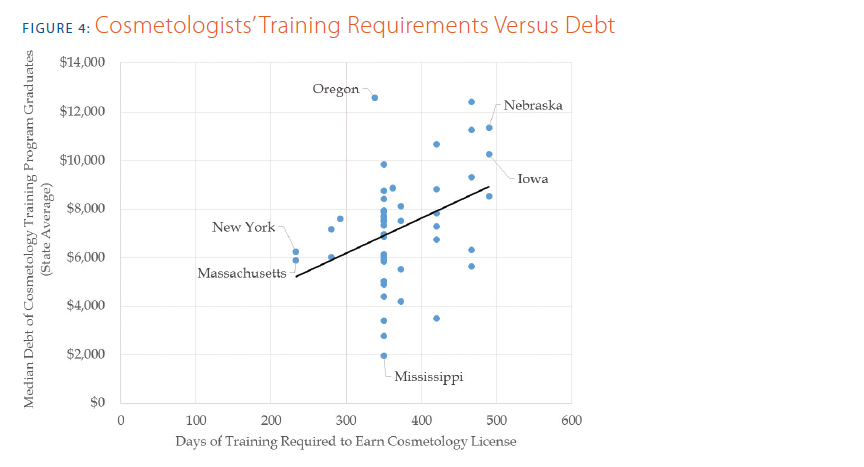
- LB 348 – Eliminate licensing, an excise tax, and other provisions of the Nebraska Potato Development Act
Following recommendations from the Department of Agriculture, this bill was aimed at eliminating a license that only one other state, Michigan, has on the books. Nebraska potato shippers are required to obtain a license in order to assess and collect an excise tax of one cent per 100 pounds of potatoes produced, packaged, or shipped.
While the Department and other government officials saw no need for the license, some potato producers and shippers thought otherwise and came to the State Capitol to testify against the legislation. In this case, it wasn’t the license that was the main issue, but the state excise tax. The farmers that testified against the legislation said the tax is necessary to help fund research and promote the Nebraska potato industry. [vii]
Because many from within the industry that are subject to the tax and license asked to keep it, the committee felt the bill was unnecessary and they decided to indefinitely postpone the legislation.
Looking Ahead
There is still more work to be done. While some bills passed the Unicameral this session, others are still sitting on the docket to be discussed in the short session. Lawmakers have also decided to continue the conversation with study committees that will take place during the interim of the 2017 and 2018 legislative sessions.
A range of occupations will be discussed in interim study committees this year including farm labor contractors, massage therapy, body art, cosmetology, and others. However, legislation that looks at occupational licensing from a comprehensive approach has still not been advanced. A piecemeal approach is not sufficient when nearly 200 occupations require a license in Nebraska.
Legislative Bill 299, the Occupational Board Reform Act, is an example of a comprehensive evaluation to determine which current and future licenses are truly needed to protect the public, or if less restrictive regulatory alternatives may be appropriate. For example, using the inverted pyramid of the least restrictive regulations, certification or registration may be sufficient to demonstrate that a minimum level of competency has been achieved in order to obtain an entry-level position in a given field.
While LB299 did not receive the same level of support as other occupational license bills in the 2017 session, this comprehensive approach will be needed if the state wants to be more competitive with regional neighbors and keep individuals from leaving in search of work elsewhere.
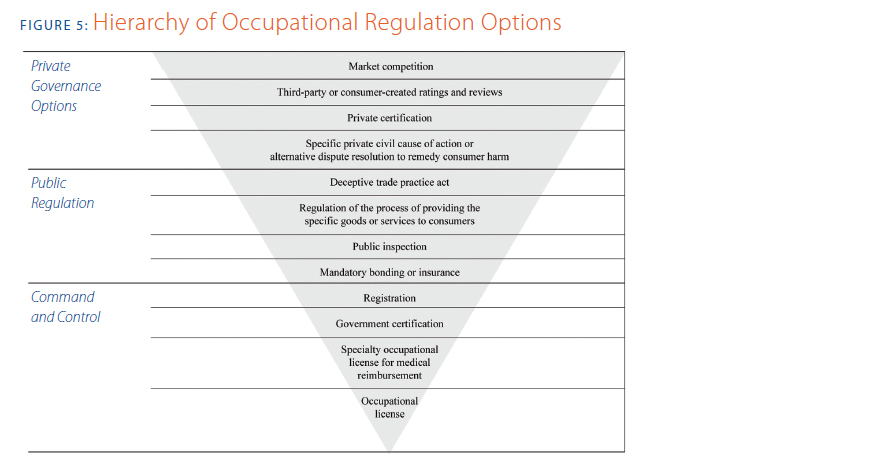
Other states are pursuing comprehensive reform, and this approach has received support from the Federal Trade Commission (FTC), an independent federal agency responsible for protecting consumers. The FTC’s Office of Policy Planning sent a letter to senators about their occupational licensing reform bills in March 2017. The letter states that the burden of occupational licensing falls hardest on economically disadvantaged citizens, that special interests often use the policies to protect their turf and limit entry to professions, and that Nebraska’s lawmakers should create a framework for scrutinizing, reducing, and when possible, eliminating these licensing requirements.
Part of that framework includes asking a set of questions when evaluating changes to occupational licensing laws such as looking back to when the original law was enacted, comparing policy objectives with expected harms from the licensing, or seeking alternatives to the current system to see if there is a less intrusive way to regulate the industry.
The FTC supports job licensing reform in Nebraska as a means of carrying out the agency’s mandate to promote competition. Their letter specifically states,
“FTC staff supports the Nebraska legislature’s ongoing efforts to review and, where possible, streamline the state’s many licensure requirements. This reform initiative has the potential to deliver significant benefits to Nebraskans, including Nebraskans looking for new or better work within the state, as well as Nebraska consumers generally…FTC staff urges legislators and regulators to consider removing excessive, unnecessary licensing restrictions wherever possible.”
In another form of competition advocacy, the FTC has also been a plaintiff in a U.S. Supreme Court case[viii] that found that licensing boards can be in violation of antitrust laws. Since most boards are run by industry members who may put their personal business interests ahead of the public interest, it is possible for licensing policies to function as an anticompetitive business practice.
In addition to the FTC and the Platte Institute, other organizations are helping to continue the momentum created in the 2017 legislature by advocating for further reform in Nebraska. The American Civil Liberties Union (ACLU) believes excessive occupational licensing is hurting Nebraska’s economy and communities by putting job opportunities out of reach. From the ACLU’s perspective, Nebraska’s burdensome professional licensing structure has kept people with a conviction of history from contributing to our economy even after serving their time. An investigative report[ix] by the ACLU shows that those with a criminal conviction are often kept from a good career, impacting their re-entry into their community and trapping them in the criminal justice system.
A shared belief that too many Nebraskans are facing barriers to a good job has motivated the Platte Institute and the ACLU to partner in advocating for the comprehensive reforms contained in the Occupational Board Reform Act.
Occupational licensing reform is not isolated to Nebraska, with a national movement growing in states over the last decade. In 2017, there were 19 states that either introduced or enacted some sort of occupational licensing reform. Three states, including Nebraska, filed bills to eliminate licensing barriers for ex-offenders, helping those with a criminal record enter the labor force. Other states, including Arizona, California, Florida, Maine, Tennessee, and Utah have also introduced and enacted legislation to reform their occupational licensing laws.
Conclusion
In recent decades, Nebraska, along with the rest of the country, has seen increasing pressure to impose new occupational licensing barriers upon citizens’ freedom to choose a career path. Nebraskans that want to pursue a particular profession should be allowed the opportunity without unnecessary hoops to jump through, including fees and inconsistent requirements that don’t make sense. Economic research has demonstrated that most of these laws do not protect the public, but are a barrier to entry for new professionals, primarily supported by those who want to limit competition.
Over the past decade, Nebraska has fallen below the national average in job creation and population growth. Until the state stops making it more difficult for people to use their skills, serve others, and earn a living, we will continue to see people leave the state for opportunities elsewhere, or choose other states over Nebraska.
Nebraska has started the conversation, and has already enacted some meaningful reforms to aid in some professions, but there is more work to be done. The scheduled interim studies must result in meaningful legislation that takes aim at the overburdensome requirements for many of the professions licensed under the Department of Health and Human Services.
Lawmakers must also see that a comprehensive review of all occupational licenses is needed and that the state cannot address this problem in a piecemeal fashion. Creating jobs, boosting entrepreneurial opportunities, reducing prices, and growing people’s incomes are all positive results of occupational licensing reform. By building upon this year’s good start, 2018 can be an even more promising year for hardworking Nebraskans.
Appendix
Exhibit 1: Nebraska Occupational Licensing Legislation in the 2017 Session
|
Occupational Licensing Reform Bills filed in the 2017 Session |
|||
| Number | Sponsor | Topic | Current Status |
| LB16 | Craighead | Changed provisions within the Nebraska Real Estate License Act. | Signed into law |
| LB18 | Kolterman | Expanded the scope of practice for dental hygienists and created a new license for dental assistants. | Signed into law |
| LB36 | Harr | Agencies review all rules and regs about issuance of occupational licensing. | Govt., Military & Vet Affairs Comm |
| LB61 | Kolterman | Creates the Interstate Medical Licensure Compact. | Amended into LB 140 |
| LB88 | Blood | Military spouses to obtain temporary licenses. Creates the Interstate Medical Licensure Compact Commission and adopts Nurse Licensure Compact. Allows licensed Audiologists to dispense hearing aids without a dispensing license. | Signed into law |
| LB109 | Blood | Military spouses to obtain a temporary teaching certificate. | Education Committee |
| LB140 | Williams | Banks and credit unions to be exempt from the department’s license. | Signed into law |
| LB283 | Riepe | Licensed practical nurses | Indefinitely postponed; portions amended into LB88 |
| LB299 | Ebke | Create an Occupational Board Reform Act and change procedures for rules and regulations. | Govt., Military & Vet Affairs Comm |
| LB341 | Lindstrom | Executive bank officer license revocation and suspension. | Indefinitely postponed; amended into LB140 |
| LB342 | Erdman | Adopt the Nurse Licensure Compact and allow temporary nursing license for military spouses | Indefinitely postponed; portions amended into LB88 |
| LB343 | Riepe | Change credentialing and regulation of cosmetology, nail technology, audiology, massage therapy, and barbers | Audiology amended into LB88; others in interim study cmtes |
| LB344 | Albrecht | Change credentialing and regulation of mental health substance abuse centers. | Health & Human Services Comm |
| LB345 | Craighead | Abstracters | Placed on General File |
| LB346 | Lowe | Motor vehicle, motorcycle, or trailer salesperson license | Signed into law |
| LB347 | Geist | School bus permits and qualifications | Placed on General File |
| LB348 | Larson | Nebraska Potato Development Act | Indefinitely postponed |
| LB364 | Walz | Professional Landscape Architects Act | Govt., Military & Vet Affairs Comm |
| LB425 | Crawford | Nurse Practioner Practice Act | Indefinitely postponed; portions amended into LB88 |
| LB454 | Lindstrom | Allow credit unions to opt out of licensing loan officers | Indefinitely postponed; portions amended into LB140 |
| LB507 | Albrect | Eliminate the Farm Labor Contractors Act | Placed in interim study |
| LB588 | Crawford | Exempt reflexology from the Massage Therapy Practice Act | Health & Human Services Comm |
| LB596 | Groene | Exempt equine massage therapy | Placed on General File |
|
Occupational Licensing Reform Legislative Resolutions for the 2017 Interim |
||
| Number | Sponsor | Topic |
| LR185 | Albrecht | Interim study to examine the Farm Labor Contractors Act |
| LR226 | HHS | Interim study to examine the electrology license in Nebraska |
| LR227 | HHS | Interim study to examine the nail technology license in Nebraska |
| LR228 | HHS | Interim study to examine the massage therapy license in Nebraska |
| LR229 | HHS | Interim study to examine the barbering license in Nebraska |
| LR230 | HHS | Interim study to examine the esthetics license in Nebraska |
| LR231 | HHS | Interim study to examine the license to practice body art in Nebraska |
| LR232 | HHS | Interim study to examine the cosmetology license in Nebraska |
Exhibit 2: Federal Trade Commission Letter to Nebraska State Senators
The Federal Trade Commission’s Office of Policy Planning has submitted a letter to Nebraska State Senators Suzanne Geist, John Lowe, Brett Lindstrom, and Tyson Larson on occupational licensing reform in Nebraska. Each senator requested the agency’s comments on their respective occupational licensing reform bills. Click here to download a PDF of the letter.
Exhibit 3: Select Occupations Discussed in the 2017 Session
Abstracter/Title Examiner
Definition
Abstracters (or Title Examiners) search real estate records, examine titles or summarize pertinent legal or insurance details for a variety of purposes. They may compile lists of mortgages, contracts and other instruments pertaining to titles by searching public and private records for law firms, real estate agencies or title insurance companies.
State Specific Information
According to the Institute for Justice, this license is required in 6 states. Nebraska is the most regulated because it is the only state requiring one year of experience before one is eligible to sit for the exam.
| State |
Fees |
Education |
Exam |
| Nebraska |
$150 |
1 year experience |
Required |
| Oklahoma |
$150 |
– |
Required |
| South Dakota |
$800 |
– |
Required |
| North Dakota |
$250 |
– |
Required |
| Minnesota |
$95 |
– |
Required |
| Iowa |
$70 |
– |
Required |
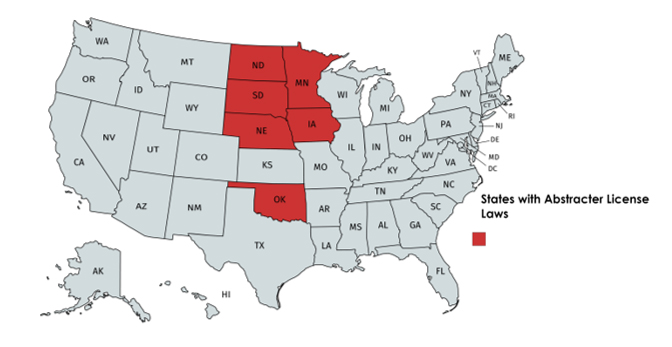
Audiologist
Definition
Audiologists are health care professionals who have obtained either a masters or doctoral degree in audiology. They are trained to evaluate, diagnose, treat, and manage hearing loss, tinnitus, and balance disorders.
State Specific Information
All 50 states and the District of Columbia license Audiologists. All 50 states and the District of Columbia also license hearing aid dispensing. Nebraska and 10 other states still require a separate Hearing Aid Dispenser license for audiologists to dispense hearing aids. The Academy of Doctors of Audiology encourages states to include dispensing under the audiologist license and to do away with the unnecessary dual licensure.
| State |
Requiring both Licenses for Audiologists |
| Nebraska |
Yes |
| Colorado |
No |
| Iowa |
Yes |
| Kansas |
Yes |
| Missouri |
No |
| South Dakota |
No |
| Wyoming |
No |
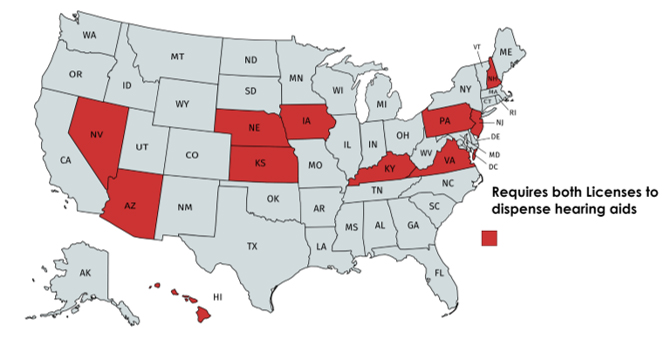
Barber
Definition
Barbers are individuals who work primarily with men’s hair and grooming needs. They cut and style hair, color it, fit hairpieces, and shave, style, and cut facial hair.
State Specific Information
Barbers are licensed in all 50 states and the District of Columbia. 26 states require 1,500 hours for barbers, while only 7 states require more. Iowa and Nebraska require the most hours in the country.
| State |
Fee |
Education |
Exam |
| Nebraska |
$190 |
2100 hours |
Practical & Written |
| Colorado |
$28 |
1500 hours |
Practical & Written |
| Iowa |
$60 |
2100 hours |
National Theory & Practical exams, Iowa board of barbering theory exam |
| Kansas |
$180 |
1500 hours |
Kansas practical, written, & State law exams |
| Missouri |
$50 |
1000 hrs. or 2000 hr. apprenticeship |
Missouri Board Practical & Written exams |
| South Dakota |
$50 |
1500 hours |
National Theory & State Practical exams |
| Wyoming |
$60 |
1250 hours |
Wyoming Written & Practical exam |

Cosmetologist
Definition
Cosmetologists and hairstylists provide beauty services, such as shampooing, cutting, coloring and styling hair and massaging and treating the scalp and may also apply makeup, dress wigs, perform hair removal and provide nail and skin care services.
State Specific Information
Every state and the District of Columbia require a license to work as a cosmetologist. Half of states require 1,500 hours of education. Nebraska, Iowa, and South Dakota are the most burdensome because they require the most trainign in the country at 2,100 hours.
| State |
Fee |
Education |
Exams |
| Nebraska |
$95 |
2100 hrs. & 2000 credits |
1 Required |
| Colorado |
$27 |
1800 hours |
2 Required |
| Iowa |
$60 |
2100 hours |
1 Required |
| Kansas |
$45 |
1500 hours |
2 Required |
| Missouri |
$50 |
1500 hrs. or 3000 hr. apprenticeship |
2 Required |
| South Dakota |
$80 |
2100 hours |
3 Required |
| Wyoming |
$96 |
2000 hours |
2 Required |
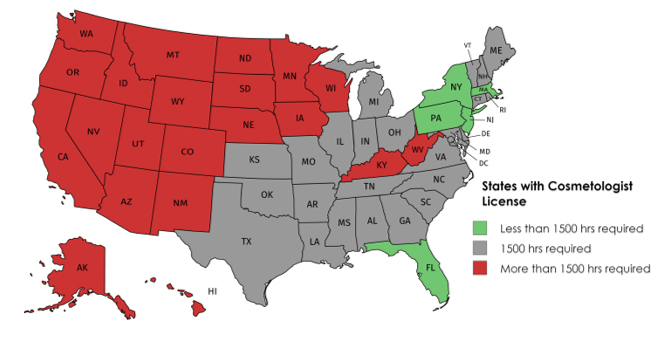
Electrologist & Instructor
Definition
Electrologists permanently remove unwanted hair from the face and body of their clients and patients through the process of using electricity to remove hair at the root.
State Specific Information
To date, 32 states and the District of Columbia have specific licensing requirements for electrologists. Nebraska has the highest fee for electrologists amongst its neighboring states. It also has the most stringent education requirement of all neighboring states.
| State |
Fee |
Education |
Exam |
| Nebraska |
$95 |
600 hrs. & 600 credits; 17yrs; High school or equiv. |
Required |
| Iowa |
$60 |
425 hrs.; .8 CEUs biennially, High School or equiv. |
Required |
| Kansas |
$60 |
500 hrs. OR 1000 hr. apprenticeship; 17yrs; High school or equiv. |
Required |
| Missouri |
– |
– |
– |
| Colorado |
– |
– |
– |
| Wyoming |
– |
– |
– |
| South Dakota |
– |
– |
– |
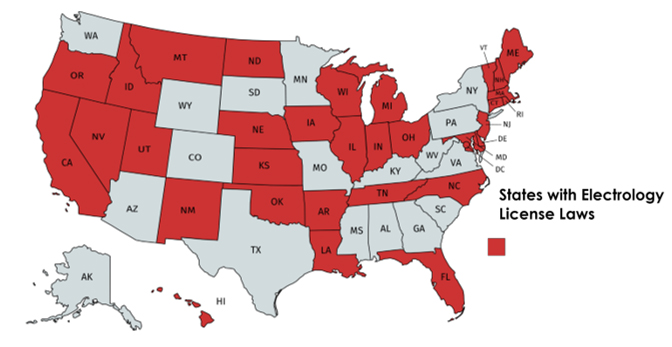
Esthetician & Instructor
Definition
Estheticians are professionals who specialize in cosmetic skin treatments which include facials, light chemical peels, microdermabrasion, body treatments, and waxing.
State Specific Information
In all states, other than Connecticut, estheticians are required to pass an examination and become licensed through their state’s Board of Cosmetology. Half of states require students to complete an esthetics program consisting of 600 practice hours, while 17 states require more hours. Some states require as few as 250 hours (Oregon) while others require as many as 1,600 hours (California).
| State |
Training |
Instructor License |
Reciprocity |
| Nebraska |
600 hrs. & 600 credits; written exam |
300 hrs. of training; pass licensure exam with 75% |
Completed 2100 hrs. and state issued exam |
| Colorado |
600 hrs. |
Repealed |
Hold valid license from other state; Military spouse 1 year exemption |
| Iowa |
600 hrs.; written exam |
1000 hr. training OR 2 yrs. of practice |
No reciprocity with other states, case-by-case review by board |
| Kansas |
1000 hrs. |
1 yr. work experience & 300 hrs. instructor training OR 450 hrs. instructor training |
No reciprocity program |
| Missouri |
750 hrs. or 1500 hr. apprenticeship |
600 hrs. instructor training OR 3 yrs. experience & 300 hrs. instructor; 75% on written & oral exams |
Depends on home state training hours; all must take NIC test |
| South Dakota |
600 hours; NIC written & practical exams: SD laws exam |
1000 hrs. salon experience; 12 clock hour instructor education course; 1000 hr. instructor program; SD instructor laws exam |
Education & work experience must be ≥ SD requirements |
| Wyoming |
600 hrs.; exam |
Practiced for 50 weeks w/36 hrs. per week; 1000 instructor course |
Training hrs. from home state must be ≥ WY requirements |
Bank Executive Officer
Definition
A bank officer is an employee of a bank given the legal capacity to agree to and sign documents on behalf of the institution. The title is usually held by branch managers, assistant managers, loan officers, and other experienced personnel.
State Specific Information
Nebraska is the only state in the country that has an Executive Officer’s License. This license only applies to state banks. National banks operating in Nebraska are not subject to this licensing law because the Department of Banking does not regulate national financial institutions. This means that in many cases, this license is required of one bank while the other bank on the same street or in the same town isn’t required to comply. In 2016, Nebraska had 166 state-chartered banks and 24 federally chartered banks in the state. This does not include national banks not headquartered in Nebraska which would include Wells Fargo, U.S. Bank, Great Western Bank and Bank of the West. The map below shows the locations of all the state-chartered banks in Nebraska (this does not include all of these bank’s branches).
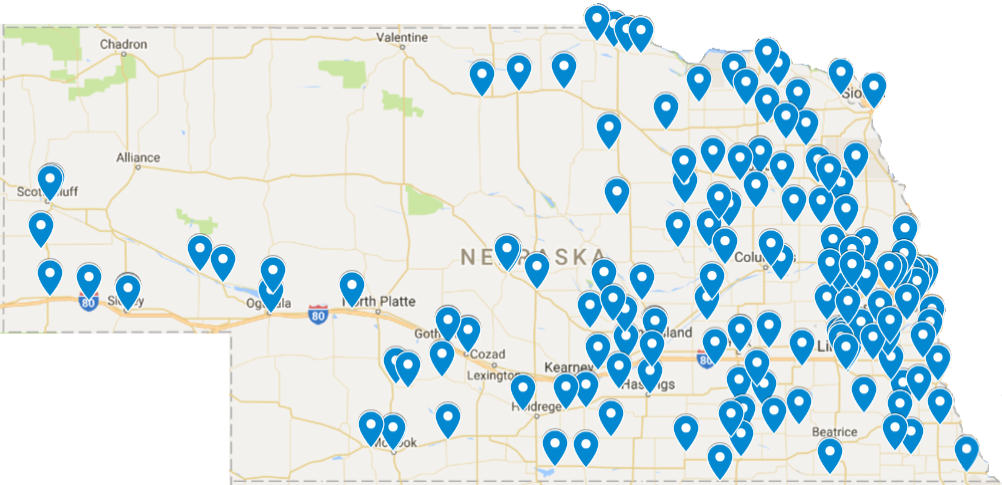
Member banks of the Nebraska Bankers Association have suggested for many years that the Executive Officer’s License requirement does not serve any meaningful purpose, and should be eliminated.
According to the Nebraska Bankers Association, enforcement actions brought against executive officers for violations of the law have been few and far between. In addition, over the past 20 years, very few individuals have been denied the right to obtain an Executive Officer’s License, due to issues uncovered during the application process. As a result, the Nebraska Banking Association feels the regulatory burden associated with this licensing requirement far outweighs any benefits derived from its existence.
Farm Labor Contractor
Definition
Farm labor contractors recruit, hire, furnish and supervise seasonal or temporary agricultural laborers for a fee and may transport, house and provide meals for workers.
State Specific Information
Only nine states in the country have this license, and Nebraska is one of the most burdensome because the license fee is the highest of all the states that require the license.
| State | Fees | Education | Exam |
| Nebraska | $750 | None | None |
| California | $600 | 9 hrs. of Continuing Edu | State licensing exam |
| Florida | $160 | None | State licensing exam |
| Idaho | $250 | None | None |
| Illinois | $50 | None | None |
| Maryland | $25 | None | None |
| New York | $200 | None | None |
| Oregon | $100 | None | None |
| Washington | $35 | None | None |
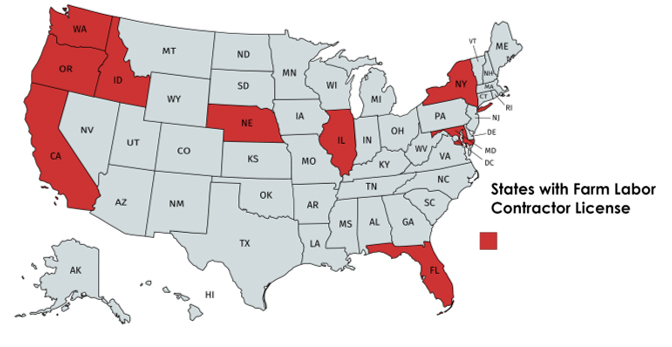
Massage Therapist
Definition
Massage Therapists are professionals that treat clients by using touch to manipulate soft body tissue (muscle, connective tissue, tendons and ligaments) with their hands.
State Specific Information
46 states and the District of Columbia license massage therapy. Nebraska was an early state (6th) to enact a massage therapy license, most enacted legislation during the 1990s and 2000s. Currently, 27 states require 500 hours of education, while New York and Nebraska have the highest requirement at 1,000 hours.
| State |
Fee |
Education |
CEUs |
Year law Enacted |
| Nebraska |
$110 |
1000 hours |
24 |
1958 |
| Colorado |
$90 |
500 hours |
none |
2008 |
| Iowa |
$120 |
600 hours |
24 |
1992 |
| Kansas |
– |
– |
– |
– |
| Missouri |
$200 |
500 hours |
12 |
1998 |
| South Dakota |
$120 |
500 hours |
8 |
2005 |
| Wyoming |
– |
– |
– |
– |
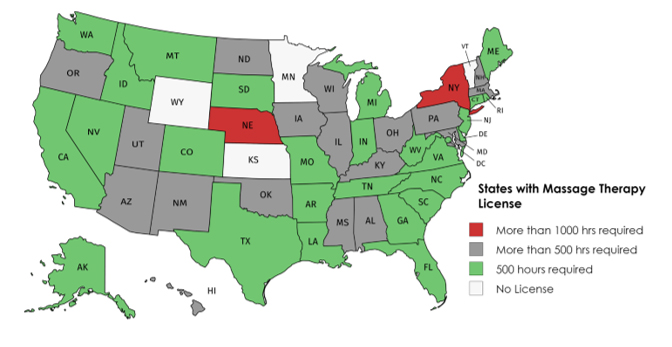
Mental Health & Substance Abuse Counselors
Definition
A Mental Health Counselor is a professional who helps people who have normal cognitive processes cope with difficult life events such as a physical illness, death, and divorce. Others help people manage serious mental illnesses like bipolar disorder. A Substance Abuse Counselor advises people who suffer from alcoholism, drug addiction, eating disorders, or other behavioral problems.
State Specific Information
All states license the mental health counseling profession and require mental health and substance abuse counselors to have a master’s degree level of education. Many states expect all professional counselors, regardless of specialty, to take the National Counselor Examination, administered by the National Board for Certified Counselors. State licensing is a separate process from national credentialing, even when the same tests are required. Some states group mental health counselors with other professional counselors. Others have multiple licensing levels for counselors and recognize unique qualifications.
In many cases across Nebraska, Mental Health Centers and Substance Abuse Treatment Centers are combined into one facility so they can provide multiple services to their clientele in one location. The current law treats these facilities as separate entities, causing them both to pay fees and be licensed separately. Nebraska also has an issue with its reciprocity agreement because if a licensed counselor were to move to Nebraska from another state, they would not be allowed to apply for a Nebraska license until they were employed.
In 2015 there were 1,047 substance abuse counselors with active licenses in Nebraska. In the same year, there were 3,681 mental health counselors with active licenses in Nebraska.
Motor Vehicle Salesperson
Definition
A Motor Vehicle/Trailer/Motorcycle salesperson assist people that want to buy a vehicle. This includes knowledge of vehicle characteristics, capabilities, features, explaining warranties, negotiating price, and completing sales or purchase contracts. These salespeople generally are employed by dealerships.
State Specific Information
22 states and the District of Columbia license motor vehicle salespeople.
| State |
Fees |
Exam |
| Nebraska |
$20 |
None |
| Colorado |
$116 |
Required |
| Kansas |
$25 |
Required |
| Iowa |
– |
– |
| Missouri |
– |
– |
| South Dakota |
– |
– |
| Wyoming |
– |
– |
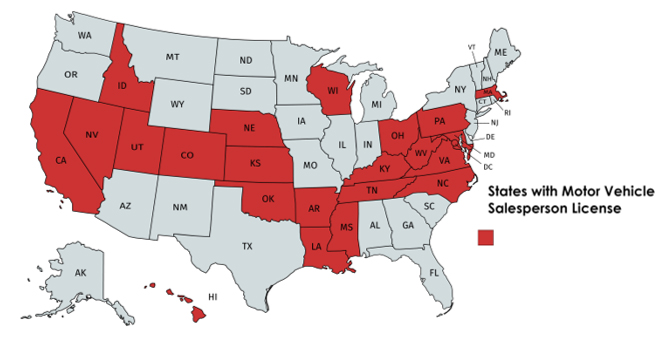
Nail Technician/Manicurist
Definition
Manicurists and pedicurists, also known as nail technicians, clean and shape customers’ fingernails and toenails and may polish or decorate nails.
State Specific Information
49 states and the District of Columbia require a license to work as a manicurist. Connecticut is the only state that does not require the license. Alabama has the most burdensome requirements at 750 hours in length and Alaska has the least burdensome requirements at 12 hours of training.
| State |
Fee |
Education |
| Nebraska |
$95 |
300 hrs. including 16 hrs. of instruction operating a nail drill |
| Colorado |
$95 |
20 credit hrs. (600 clock hrs.) |
| Iowa |
$180 |
325 hours |
| Kansas |
$140 |
350 hours |
| Missouri |
$120 |
400 hours |
| South Dakota |
$80 |
400 hours |
| Wyoming |
$97 |
400 hours |
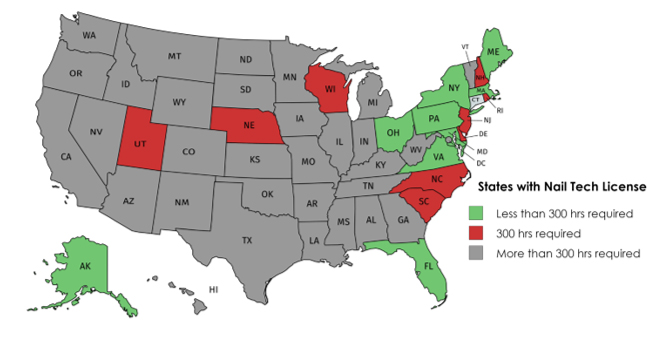
Nurse
Definition
A person trained to care for the sick or infirm, especially in a hospital.
State Specific Information
In 2000, the National Council of State Boards of Nursing launched an initiative to expand the mobility of nurses. Currently, there are 25 states that are participating in the compact. Nebraska became part of the compact in 2001.
Since the original compact’s inception in 2000, it has undergone significant revisions, resulting in new model legislation to supersede the current statute. The new eNLC becomes effective when no less than 26 states have enacted legislation or on December 31, 2018. To date, 9 of the 25 states in the current compact have enacted the eNLC legislation. The proposed language would repeal the current NLC (of which Nebraska is a member) and adopt the new eNLC.

Potato Shipper
Definition
A potato shipper is anyone who is in the business of shipping potatoes and selling potatoes grown in Nebraska.
State Specific Information
According to research done by the Platte Institute, the only states that license potato dealers are Nebraska and Michigan. The USDA reported for 2015 that Nebraska had 15,500 planted acres of potatoes which produced $60,085,000.
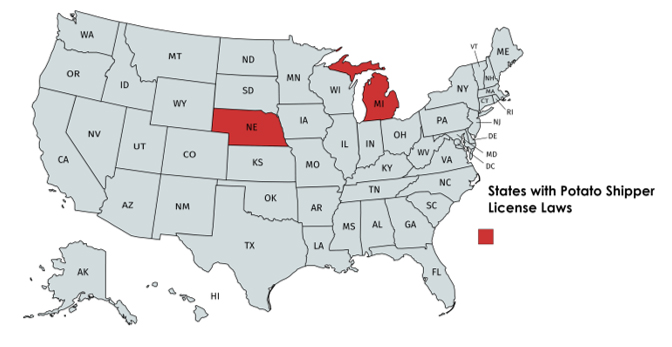
Reflexologist
Definition
Reflexology is a protocol of manual techniques applied to specific reflex areas predominantly on the feet and hands.
State Specific Information
Reflexology is typically licensed through the broad definition of massage therapy. Reflexology is exempt from massage laws in 34 states and the District of Columbia. Four states have their own reflexology regulations and 4 states have no massage law and reflexology is not regulated or licensed. In many counties and cities with massage laws, professional reflexologists have received an exemption.
| State |
Exempt from Massage Status |
| Nebraska |
No, does not exempt from massage law |
| Colorado |
Yes, exempt from massage |
| Iowa |
Yes, exempt from massage |
| Kansas |
No massage law |
| Missouri |
Yes, exempt from massage |
| South Dakota |
Yes, exempt from massage |
| Wyoming |
No massage law |
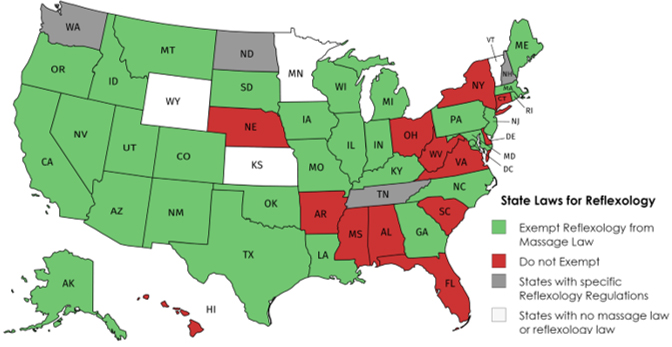
School Bus Driver
Definition
School bus drivers transport students, regardless of the number, to and from schools in Nebraska. Drivers ensure adherence to safety rules and may assist passengers in boarding or exiting.
State Specific Information
The Federal Motor Carrier Safety Improvement Act of 1999 (MCSIA) was enacted by Congress. Nebraska adopted the MCSIA requirements which went into effect in 2005. The MCSIA covers all vehicles over 26,000 pounds or which carry 16 or more passengers including the driver. The “S” (school bus) endorsement was created for operators of school buses where the operator is required to hold a CDL. Under federal law, a CDL holder must have an “S” and “P” (passenger) endorsement to drive a school bus in all 50 states.
Many states had school bus permits prior to the 1985 federal legislation for CDLs and the 1999 federal legislation to ensure the safety of their school bus drivers. Almost all states that had this permit have eliminated this provision in lieu of the redundancy of the federal CDL laws. The only states that still require a school bus driver permit are Illinois and Nebraska.
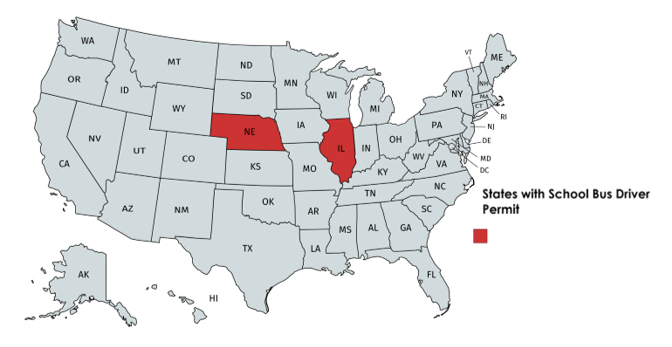
[i] University of Minnestoa, Humphrey School of Public Affairs, Professor Morris Kleiner’s Research on Occupational Licensing Influences Federal Policy. (2015 May 1). Retrieved from https://www.hhh.umn.edu/news/professor-morris-kleiners-research-occupational-licensing-influences-federal-policy.
[ii] Kleiner, Morris M., Vorotnikov, Evgeny. (2016 August 9). Analyzing Occupational Licensing Among the States. Page 15. Retrieved from https://perma.cc/EB34-SBA4.
[iii] The White House. (July 2015). Occupational Licensing: A Framework for Policymakers. Retrieved from https://perma.cc/U7J2-V9XD.
[iv] Winegarden, Wayne. (July 2015). The 50-State Small Business Regulation Index, Pacific Research Institute, https://www.pacificresearch.org/fileadmin/images/Studies_2015/SmBusinessIndex_UpdatedVersion2_web.pdf
[v] Bachman, Paul; Tuerck, David. (April 2017). The Cost of Regulation in the State of Nebraska. The Beacon Hill Institute.
[vi] The State of Nebraska, Office of Governor Pete Ricketts. (2017 January 10). Gov. Ricketts, Senators Unveil Occupational Licensing Reforms [Press release]. Retrieved from https://governor.nebraska.gov/press/gov-ricketts-senators-unveil-occupational-licensing-reforms
[vii] Duggan, Joe. (2017 February 2). Proposal to end potato production tax comes under scrutiny by unlikely group – potato producers, shippers. Omaha World-Herald, http://www.omaha.com/news/legislature/proposal-to-end-potato-production-tax-comes-under-scrutiny-by/article_1b29ed0e-e8b2-11e6-bcec-ab17ce172696.html.
[viii] North Carolina Board of Dental Examiners v. Federal Trade Commission, Docket No. 13-534, Opinion on 2015 February 25, https://www.supremecourt.gov/opinions/14pdf/13-534_19m2.pdf.
[ix] ACLU (2016 September 6), “Second Chances: How Professional Licensing in Nebraska Hurts the Workforce and our Economy”, https://www.aclunebraska.org/en/publications/second-chances-how-professional-licensing-nebraska-hurts-workforce-and-our-economy.
